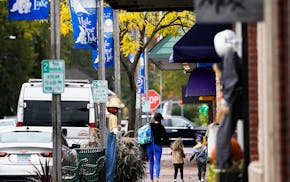Sand Island, one of the Apostle Islands, was closed to overnight camping Monday because of bears entering campsites and finding food. Park employees thought a temporary halt on camping would mean less food on the island, which would reduce bear activity.
But some daytime visitors who left sausages and other food packed in a cooler in their beached boat Wednesday — a correct thing to do — discovered a bear repeatedly entering the boat to get at the food when they left it to walk along the shore, said Apostle Islands National Lakeshore Superintendent Bob Krumenaker.
"The bear is very assertive; it's not afraid of going where people are," he said. "He does run away when people make noise or try to scare him, but that doesn't last very long."
The incident prompted officials to close the island to all visitors late Wednesday. Krumenaker said he isn't sure how long the island will be closed, but the situation will be re-evaluated frequently.
Some of the earlier bear behavior, which prompted the nighttime closing, included a bear breaking into a tent for food and a bear poking his head inside the door of a tent with people inside. It's not known whether it's the same bear or multiple bears, but it or they are curious, Krumenaker said, and not staying away from people.
"He's not done anything aggressive toward people, and we want to keep it that way," he said, noting it's an inconvenient time for visitors, but "we don't want anyone injured by a bear."
Park workers now are trying to determine the number of bears on Sand Island; cameras have been installed. They also are working to "give the bear a hard time." That means making a lot of noise and throwing non-harmful things at the bear to make it think people are not who it wants to be around, Krumenaker said.
Krumenaker said the heightened bear activity probably is due to the prolonged cool weather and lack of ripe berries. He said it's important that visitors to the other islands be careful about making sure food isn't left unattended.
People are guests in the bears' home, he said. Trapping and moving them doesn't solve the problem, and killing them isn't the answer.
"We're a national park," he said. "We protect wildlife."

Shop the curbs for free on 'Trash to Treasure Day' in White Bear Lake

Meet the Athena Award winners: 103 female athletes honored by their schools

Lacrosse lists: 21 top players and the school that's No. 1 for boys and girls

